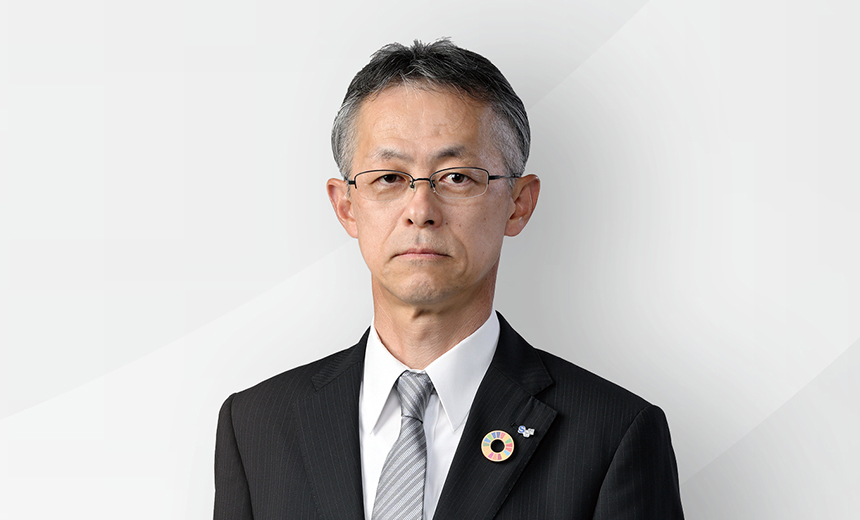Message from the Top Management
Excerpt from the Integrated Report 2025
How do you look back on the previous Mid-Term Management Plan, “SGH Story 2024?”
Three years of the previous Mid-Term Management Plan, when we laid the groundwork for future growth
Looking back on the previous Mid-Term Management Plan, “SGH Story 2024” (covering FY2023/3 to FY2025/3), we implemented various measures in response to the changes in the external environment, that far exceeded our initial expectations. While the effects of these measures are yet to fully materialize, we were also able to lay the foundations for future growth during those three years.
Although I took the helm as President midway through the previous Mid-Term Management Plan period. From the second quarter of FY2023/3, immediately after I took office, the number of packages in the Delivery Business began to decline due to changes in the business environment, and the performance of the Global Logistics Business was also weak due to factors such as the absence of the special demand fueled by the COVID-19 pandemic. Given the circumstances, we made it our top priority to fully understand and recognize the situation at the time and implement measures to address those issues.
The first three steps we took were to secure resources to maintain our logistics infrastructure, change our sales promotion structure, and reorganize our approach to shareholder returns. In the midst of full-scale measures to address the “2024 problem” and a shift to a rapidly inflationary environment, our goal was to prevent the loss of personnel that help keep our business running and to maintain our logistics infrastructure. To this end, we placed particular focus on improving the working environment and compensation paid to Group employees and partner companies. We worked to swiftly implement these measures, which I believe have achieved a certain level of success.
The business environment is undergoing rapid and drastic changes amid the post-COVID-19 era, turbulent international affairs, and intensifying competition in the domestic express package delivery service industry. We recognize that it is an ongoing challenge to grasp the increasingly diverse and sophisticated logistics needs of our customers resulting from these changes more quickly than ever before, and reflect these needs in our strategies. As part of efforts to address the situation, we have also begun improving our sales promotion system with a view to Groupwide optimization. We are accelerating our initiatives to consolidate customer information, which is the starting point for our solutions, with the aim of building a system that facilitates collaboration between sales teams and on-site operations across the Group.
We also reorganized our approach to shareholder returns. When we announced our new Mid-Term Management Plan, we set a dividend policy calling for progressive dividends and flexible share buybacks, and set a three-year cumulative total return ratio of 60% or more. We will build a long-standing relationship of trust with our shareholders by continuing to provide them with steady returns.
The harsh business environment during the previous Mid-Term Management Plan led to decisions that took into account not only the current environment but also medium- to long-term changes in the external environment. We believe that the inclusion of Meito Transportation, Hutech norin and Morrison to the Group has laid the groundwork for future growth by strengthening our foundation for providing Total Logistics as outlined in our “SGH Vision 2030.” The reason behind the consolidation of the two companies is that Japan will inevitably experience a population decline in the future, and with no prospects for a significant increase in GDP, we believe that simply relying on domestic express package delivery services will not be sufficient for the Company to achieve significant growth going forward. Looking at demand for express package delivery alone, we expect a moderate increase, driven by factors such as a rise in the e-commerce ratio. However, as there are many players in the last mile of transportation, competition is still overheated. To differentiate from industry peers, I believe that we need to become a logistics company that can provide comprehensive services upstream in the supply chain, starting from our strengths in express package delivery services; in other words, become a logistics partner that can provide Total Logistics. To this end, we need to forge ahead with enhancing the sophistication of our solution proposals based on our existing customer base and business foundations, and to acquire new customers and business foundations in areas with prospects for growth. As a means to secure these, We chose M&A as a strategic approach. Meito Transportation and Hutech norin operate in the area of low-temperature logistics, while Morrison operates in the high-tech and semiconductor-related logistics areas. These are all areas in which our Company did not have sufficient resources, but ones with prospects for future growth, making their main battlefields areas that perfectly match our Group’s Total Logistics strategy. I believe that we can definitely create good synergies with these companies, and that these M&As have brought us closer to realizing our goal of providing Total Logistics services.
What approach will you take to achieve the “SGH Vision 2030”?
We recently redefined our Long-Term Vision, “Grow the new Story. New logistics, nurturing a new society together,” in simpler terms as “continue to be an indispensable presence (= infrastructure) for our customers and society.” Our goal of “continuing to be an infrastructure” is based on our sense of mission as a logistics company. Food and other resources are essential for people to survive. In modern society, it is difficult for many people to obtain these resources on their own, so someone needs to deliver them from the producer to the people. As the Group plays a role in this delivery, our major premise is that we must “continue to be an infrastructure” without stopping our operations, not only in normal times but also in times of disasters and other emergencies. With these aspirations at heart, we will carry out our business activities with pride, knowing that we are part of society’s infrastructure, and that this vision will also serve as the source of our sustainable growth.
Building Total Logistics solutions that meet the needs of our customers
The value that the Group must create to “continue to be an infrastructure” is the provision of Total Logistics. Total Logistics we are aiming for is the provision of logistics that does not overlook even the smallest needs of our customers, and solves potential issues. In other words, it means to provide highly convenient solutions that not only focus on ensuring the reliable delivery of packages, but also cover the transportation methods and logistics functions before and after delivery. For example, even when it comes to express package delivery services, I think there are many customers who use different companies depending on the size of the package and others, but in reality, doing so must be cumbersome. I believe that providing a comprehensive range of transport methods, from mailbox delivery, express package delivery, low-temperature logistics, heavy item delivery, special transportation, and even overseas delivery, will enable the SG Holdings Group to continue to be indispensable for our customers, and even to grow into an essential infrastructure for the consumers beyond our customers, and ultimately for society as a whole. Customizing delivery methods to align with customer needs is an area of expertise that we have continued to practice as part of our “Hikyaku no Kokoro” since our founding. We are confident that we can achieve Total Logistics by horizontally deploying the know-how we have cultivated over many years across a wide range of business areas.
We have expanded our customer base and business foundations both in Japan and overseas based on our express package delivery services business. However, we recognize that there is still variation in the logistics areas in which we excel, and that we are only able to meet a portion of needs. We will integrate logistics solutions that extend from upstream to downstream, while digging even deeper into customer needs for each business and function. Through this integration, we aim to manage our customers entire supply chain which is crucial for our future business growth.
To ensure the smooth implementation of our growth strategy, as President, I not only manage and supervise the execution of each business, but I also believe it is important to directly communicate in my own words to the heads of each Group company what we will do to realize this plan, and to share our vision with the entire Group. For this reason, since becoming President, I have been providing opportunities for information exchange among Group companies several times each month.
Based on the discussions that took place during such exchanges, when announcing our new Mid-Term Management Plan, we fleshed out our specific management targets for FY2030, set management targets for each segment and associated strategies. Also, we were conscious of making this information easier for people outside the Group and all employees in the Group to understand what we are aiming for and how we are going to achieve this. To achieve our targets, we will respect the independence of each Group company, while deepening mutual understanding through in-depth dialogue and building a system that allows for shared responsibility.
What are the key strategies of the new Mid-Term Management Plan, “SGH Story 2027,” and what are the most important issues to be addressed in achieving them?
Key strategies of the new Mid-Term Management Plan “SGH Story 2027”
We have positioned “SGH Story 2027,” which started this fiscal year, as the second stage in achieving the “SGH Vision 2030.” We are positioning the three years of the plan as a period in which to generate investment benefits based on the measures kicked off during the previous Mid-Term Management Plan.
Our basic policy is “More advanced Total Logistics and expansion of global logistics infrstructure." To achieve this, we have established nine key strategies.
In terms of business activities, we aim to expand the scope of our operations, starting with the stable growth of our Delivery Business, including express package delivery services, through moves such as strengthening our low-temperature logistics areas by adding Meito Transportation and Hutech norin to the Group, and enhancing the foundation of our Global Logistics Business by adding Morrison to the Group. We will also accelerate our initiatives aimed at achieving the targets set forth in our Mid-Term Management Plan by increasing the added value of our domestic logistics and expanding the scope of our TMS business. Furthermore, we will continue to address sustainability, which underpins these initiatives, and promote enhancement of governance within the Group.
Among these, the three most important points are the development of the overseas business, acquisition and utilization of human resources, and the resolution of social and environmental issues.

Provision of Total Logistics through the expansion of our overseas infrastructure and synergies with domestic operations
The business challenge we need to focus on in “SGH Story 2027” is expanding the infrastructure of our global business. When compared with the rest of the world, Japan’s express package delivery industry is extremely unique. In Japan, express package delivery is typically conducted face-to-face, and is characterized by attentive services, such as delivery within one or two days without additional charges and the ability to specify a desired delivery time, all at low cost. However, for example, Japanesestyle express package delivery services have not been in demand in the United States. As such, at this stage it is important to conduct business in a manner that is appropriate to the different business practices in each country. We aim to expand our overseas business by building a system in which business practices and culture do not become obstacles to business, such as by appointing local personnel to the top positions of our local subsidiaries, while also conducting operations based on the view that these personnel will uphold governance to the same standards as in Japan, as members of the SG Holdings Group.
Recently, our local subsidiary in the United States has been receiving inquiries asking if it is considering deploying the same services as in Japan. As countries around the world become societies with extremely low birth rates and aging populations, there is a possibility that the need for Japanese-style express package delivery services will gradually increase. Therefore, we believe that it is necessary to make preparations so that we can provide last mile services at any time, such as by improving the service quality of our domestic business.
Furthermore, we can utilize the brand power of Sagawa Express when doing business overseas, as it is well known among Japanese companies.

On the other hand, it’s true that Sagawa Express lacks know-how in international transportation such as forwarding, given that its most prominent service is express package delivery. The key lies in the companies acquired through M&A, and in collaborating with Morrison and Expolanka, to expand our overseas business from the forwarding area. We will then expand our coverage to the entire sales logistics areas while strengthening our 3PL and other businesses in producer and consumer countries, our target customers. This is where Total Logistics has the greatest potential.
Creating a comfortable work environment and fostering motivation are the key to securing human resources
People are indispensable in logistics, a labor-intensive industry. I believe that we should prioritize improving working conditions and wages so that people on the ground, including not only drivers but also workers in warehouses and transfer centers, feel motivated and supported in their work.
The Japanese logistics industry surrounding the Group is facing a major turning point triggered by the “2024 problem.” Although it is expected that this will lead to improvements in the working environment, such as limiting the overtime work of truck drivers to 960 hours per year, it will also necessitate major changes to our business structure and work methods. To resolve this issue, it is essential that we increase operational efficiency and focus resources on areas where they are truly needed. In order to focus on our core business of delivering goods, the Group will also continue to invest in cutting-edge technology, such as by conducting experiments to replace the task of loading packages onto trucks with AI-equipped loading robots. In addition to our individual company efforts, cooperation across the logistics industry and fostering a society-wide mindset are also necessary. For example, if the scheduled delivery time for each package were categorized according to its urgency, less urgent items could be collected at distribution centers and delivered only when a certain amount had been accumulated, thereby increasing the loading rate of trucks.
As for improving wages, real wages are being eroded due to ongoing inflation and households are tightening their purse strings.
Logistics companies are also facing rising costs, and unless they share a certain amount of the burden with their customers, the industry as a whole may well see an exodus of human resources, making it even harder to deliver goods.
We must share awareness of these challenges facing the logistics industry with our customers and society, strive for overall optimization, and further enhance the appeal of logistics as an industry. To achieve this, we need to cooperate with national and local governments, and when doing so should take an approach that transcends the boundaries of companies and industries.
On the other hand, over the medium- to long-term, for diverse personnel to thrive, simply improving working conditions is not enough; a sense of belonging to the company and motivation are also important. For example, we need to adjust our evaluation standards, as well as change the mindset of the logistics area, which has been male-dominated up until now. With in-house learning and training related to diversity as a driving force, we will build a system that fairly evaluates the achievements of female, junior, and non-Japanese employees. When measuring employee engagement surveys, we need to refine our analytical methods so that results are linked to job satisfaction and achievements, rather than simply improving results through single measures such as salary and benefits.
Giving back to society the know-how cultivated through disaster prevention and relief efforts
For the SG Holdings Group to “continue to be an infrastructure,” it is also essential that we solve social and environmental issues through our business activities. We place importance on Total Logistics as the value we provide, which can also contribute to solving social and environmental issues. For example, we will work to achieve carbon neutrality with an eye to realizing a sustainable society by establishing a reverse logistics system that enables the recycling and reuse of resources, and by reducing the CO2 emissions of our vehicles and facilities.
In particular, in March 2025, we established the SGH Disaster Prevention Support Foundation with the aim of resolving the social issue of disaster prevention in Japan, where natural disasters occur frequently. The Foundation, which conducts disaster prevention projects in cooperation with the government, will utilize the Group’s logistics know-how to prepare warehouses, stockpile various relief supplies, and own and manage delivery-related equipment and materials in order to ensure the rapid delivery of supplies to disaster-affected areas and evacuation centers. In doing so, it will provide assistance in areas where national and local governments and private companies have not been able to reach.
Looking back, the Group’s disaster relief activities began with the Great Hanshin-Awaji Earthquake. After the earthquake struck, we were allowed to use space under the railway tracks at Shin-Kobe Station to set up a logistics base. Then, using the helicopter we owned at the time to search for passable routes, our employees visited the victims to check on and transport relief supplies.
In these activities, I believe that we put into practice the know-how cultivated through our day-to-day sales activities, particularly our know-how to absorb the needs of our customers. Since then, we have continued to provide disaster relief support, including in the wake of the Great East Japan Earthquake, the Kumamoto Earthquake, and the most recent Noto Peninsula Earthquake. I have heard that these initiatives have led to many people in the disaster-affected areas becoming Sagawa fans. We have been involved in various disaster relief activities to date, including providing voluntary support and assisting with transportation-related tasks at the request of national and local governments. Our desire to expand the disaster response know-how we have cultivated through these efforts into areas that we have not been able to cover until now, and to prepare for the next emergency, led us to establish the Foundation. In order to prepare for disasters that could occur at any time and to ensure the Foundation’s stable and permanent activities, we have decided to allocate our treasury shares to the Foundation through third-party allotment, with the dividend from these shares to be used as a source of funds for its activities. This is because dividend income is not as heavily affected by our short-term performance as donations, and is considered to be an appropriate source of funding in light of the Foundation’s activities. As a logistics company, the Group uses public roads maintained by national and local governments free of charge to conduct our business. We are strongly committed to giving back to national and local governments, our important stakeholders, especially in times of emergency. Maintaining logistics functions and fulfilling our social responsibilities even in times of emergency embodies our vision of “continuing to be an indispensable presence (=infrastructure) for our customers and society.” We believe that gaining the trust of our customers and society in this way will lead to sustainable growth and the enhancement of our corporate value.
What is your approach to enhancing SG Holdings’ corporate value in a sustainable manner?
Implementing management that is conscious of cost of capital and stock price to achieve further growth
When announcing the current Mid-Term Management Plan, in addition to “realizing what we want to be,” that I have mentioned multiple times in the past, I also raised “enhancing our corporate value and share price” as an important theme that I wanted to convey to everyone. With an eye to 2030, we will steadily generate growth investment benefits, such as through investments in transfer centers in the Delivery Business and the M&A of two companies, and we will use the generated cash to return profits to shareholders and to fund future growth investments, thereby enhancing our corporate value and share price.
We have set an ROE target of 15% for FY2030. We will enhance ROE by striving to grow our business through the provision of Total Logistics while increasing the return on capital for each segment, as well as by adopting appropriate financial strategies.
We believe that the two M&A deals carried out in FY2025/3 mark a milestone in our large-scale growth investments. While some of the funds will be disbursed during the period of the current Mid-Term Management Plan, we will work to generate benefits as soon as possible. As I mentioned at the beginning, we have also enhanced our shareholder returns, such as clarifying our progressive dividend policy and setting a new total return ratio target.
Reducing the cost of shareholders’ capital is also important in enhancing corporate value. To ensure management transparency, we have set out the enhancement of governance as one of the key strategies in our Mid-Term Management Plan. In light of our dialogue with capital markets, we have also begun to enhance governance in line with the perspectives of our shareholders, such as by reviewing the composition of the Nomination and Remuneration Advisory Committee and introducing ROE and TSR criteria for determining Director remuneration. I will continue to place emphasis on communication that will enable shareholders to gain a deeper understanding of the Company’s present and future and feel reassured about our growth, including by creating opportunities for direct dialogue.
Through continued dialogue and information disclosure, we hope to gain the understanding of not only those in the capital markets, but also our customers, business partners, employees, and partner companies regarding our sustainable growth, and to build relationships that allow us to grow together.
“Hikyaku no Kokoro” is the spirit that drives us to constantly consider what we can do for our customers and devote ourselves wholeheartedly to serving them, which is the cornerstone of the company’s foundation. Going forward, we will continue to strive for sustainable growth and the enhancement of our corporate value to meet the expectations of all our stakeholders.
November 11,2025
Hidekazu Matsumoto
President and COO







